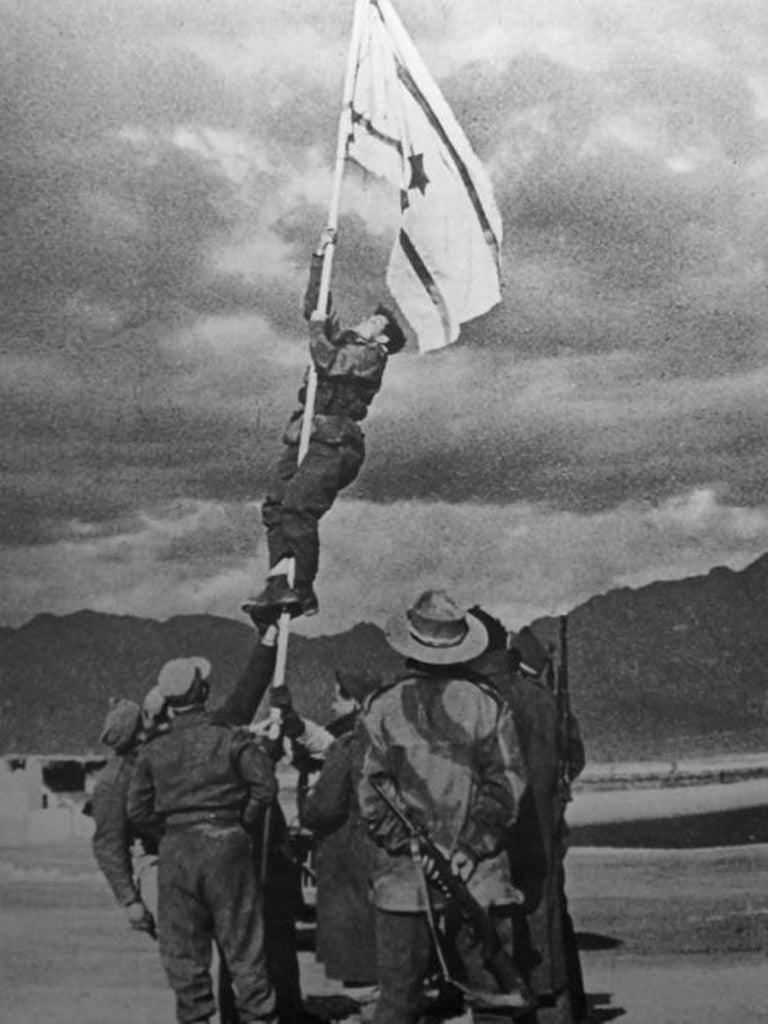General Avraham Adan: Soldier who raised the 'Ink Flag' that signalled the birth of Israel
He was one of the few generals to survive public criticism after the Yom Kippur War in 1973

General Avraham Adan, nicknamed "Bren", was one of Israel's most famous soldiers, a veteran of the Suez War, the Six-Day War and the Yom Kippur War. But he was best-known in Israeli as the man who raised the so-called "Ink Flag" at Eilat which symbolised the end of the first Arab-Israeli war – known to Israelis as the War of Independence – in 1949. The image of Adan hoisting a makeshift flag – with two blue ink stripes and a Star of David torn from a first-aid kit and sewn on to a white cloth – became Israel's equivalent of the iconic photo of US Marines planting the Stars and Stripes on Iwo Jima in 1945. Adan later became Israeli military attaché in Washington, a key liaison between the Israeli and US governments during the turbulent Middle East years of the mid-to-late-1970s, including the early years of the Lebanese civil war on Israel's doorstep.
As commander of the 162nd Division of the Israeli Defence Forces (IDF) – nicknamed the Bren Division – Adan helped change the course of the Yom Kippur War in October 1973 when the Israelis were caught napping by Egyptian and Syrian forces. He was defending Israel's northern zone when the war broke out and for three days saw his division suffer severe losses while trying to repel the Egyptians and push them back across the Suez canal. Later in October, although he himself had been wounded, he regrouped and in Operation Stouthearted Men led his troops across the canal into Egyptian territory, turning the tables and destroying the Egyptian 25th Brigade before surrounding the Egyptian Third Field Army and helping end the war on favourable terms for Israel.
As Israelis began reflecting on a war that had cost more than 2,500 lives, Adan was one of the few generals to survive public criticism and the ensuing inquiry into the initial failures of the IDF. He was rewarded with the military attaché position in Washington DC, where he effectively became a Middle East adviser to President Gerald Ford while seeking to uphold Israel's interests.
Avraham Eidelson, who took on the surname Adan later, was born in 1926 in the kibbutz of Kfar Giladi in Upper Galilee, at that time part of British-mandated Palestine. At 17 he enlisted in the Palmach, the élite strike force of the Haganah, the underground Jewish opposition to the British mandate and, after war broke out with the new state of Israel's Arab neighbours in 1948, as a company commander in the Negev Brigade he took part in Operation Uvda to capture the Jordanian outpost of Umm Rashrash, now known as Eilat, on the Red Sea at the southernmost tip of the new Israel.
It was there, on 10 March 1949, that he clambered up a pole to hoist the improvised "Ink Flag"; the photo of Adan and his men became an enduring image to Israelis, a symbol of independence. After the war, the Palmach formed the backbone of the new IDF High Command, and became a major influence on Israeli culture and politics. Adan went on to serve in the Israeli Armoured Corps and he founded the IDF's first Sherman tank unit.
As a Lieutenant-Colonel during the 1956 Suez War he had commanded the 82nd Battalion of the 7th Armoured Brigade in the Sinai desert, defeating several Egyptian forces in the region. He would later become commander of the 7th Brigade. When Israel launched the Six-Day war of June 1967 he fought in the Sinai as deputy commander of the Armoured Corps becoming commander of the Corps on 20 March 1969, 20 years to the day after he hoisted the Ink Flag.
On retirement from the IDF, Adan became Israeli police comptroller and joined the Movement for Quality Government (MQG) in Israel, an apolitical, non-profit organisation which has become something of a citizen's watchdog group. He was also a member of Israel's Council for Peace and Security.
"Bren was one of the most important combat officers the IDF has ever had," said Israel's Minister of Defence Ehud Barak, who served under Adan during the Yom Kippur war. "He led by example with his calm and level-headed approach and grace under fire. Many generations of fighters will forever remember him." President Shimon Peres added: "General Adan dedicated his life for the security and fortification of the state of Israel. He was an outstanding fighter and commander."
Adan's daughter Neta said, "He was a man whose history was completely intertwined with the history of our country. He was modest to shy, a humanist with respect for all – Palestinians and Jews. He believed that the country should be split up into two countries, upholding the rights of the Palestinians." Adan died after suffering a cardiac arrest at home. His wife Miriam died last year. He is survived by his children, 11 grandchildren and six great-grandchildren.
Avraham Eidelson Adan, soldier and diplomat: born Kfar Giladi, British-mandated Palestine 5 October 1926; married Miriam (died 2011; three children); died Ramat Hasharon, Israel 28 September 2012.
Join our commenting forum
Join thought-provoking conversations, follow other Independent readers and see their replies
Comments